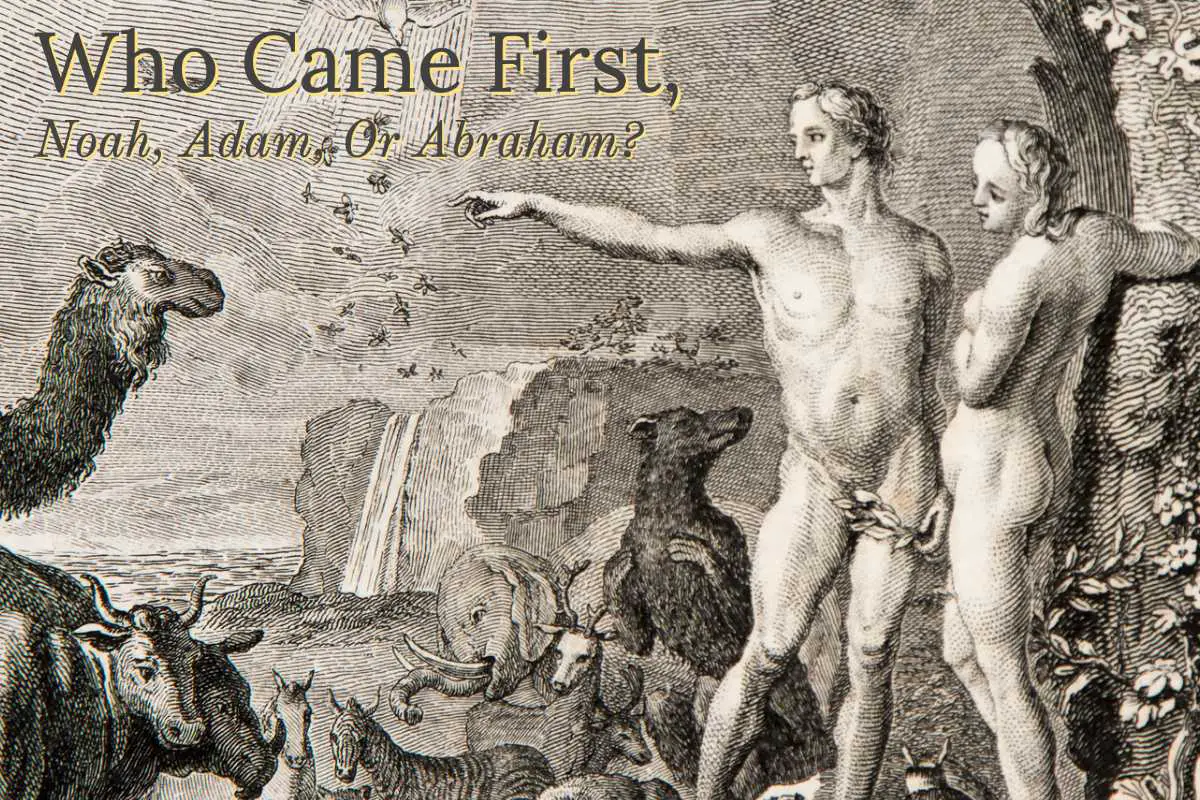If you are reading the Bible, it can be confusing to precisely the order of the prophets. Some of the more popular prophets are Noah, Abraham, and Adam.
Adam came to the earth first and is considered the first man to live on the planet. Noah is also related to Adam, but ten generations separate them. Abraham is also related to Adam and Noah, but four generations separate Noah and Abraham, and 14 generations separate Abraham and Adam.
Table of Contents
- Adam Came First – He Was The First Man On Earth
- Noah Lived After Adam
- Abraham Lived After Noah And Adam
- Frequently Ask Question
- Related Content
Adam Came First – He Was The First Man On Earth
Christians all consider Adam to be the first man who lived on the earth. Adam and Eve were first together in the Garden of Eden, then Eve partook of the forbidden fruit, and they were cast out of the Garden of Eden to live on earth.
Adam and Eve were the first man and woman to live on the earth. Because they were cast out of the Garden of Eden, they could now live on earth, bear children, raise their families, and work for their daily bread.
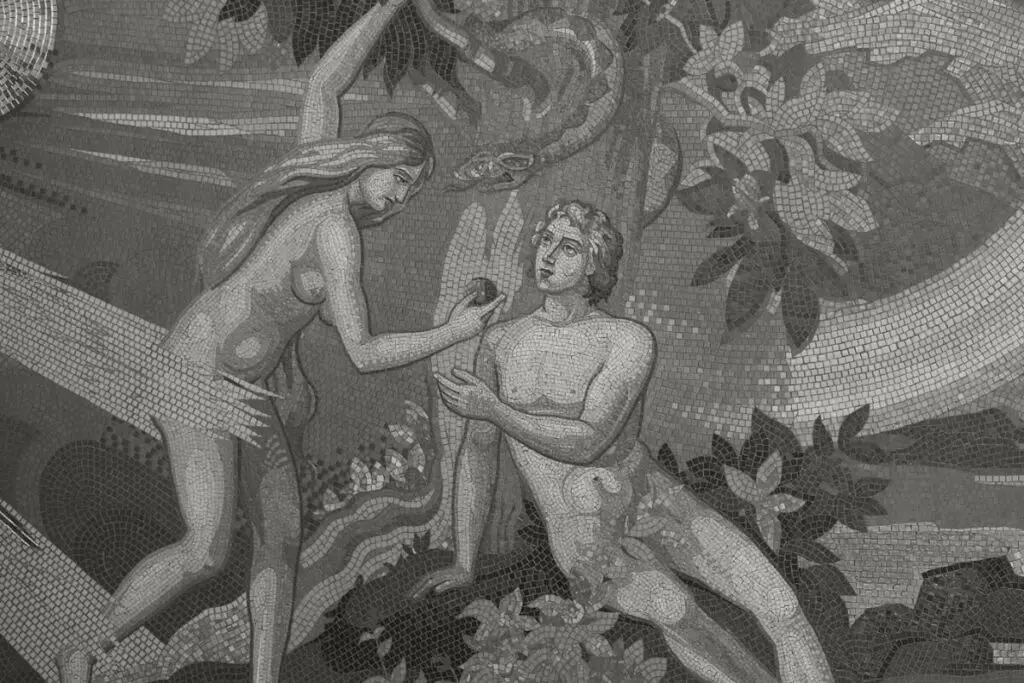
If we look at your genealogy or family history, all men or women begin with Adam and Eve. We are all related to Adam and Eve, who were the first man and woman on earth,
Adam and Eve understood the gospel of Christ, and so they also taught this to their children.
Adam was known to live a long time, about 930 years, but a few years before his death, he gathered his family and blessed them so they could continue teaching their children.
We know that Adam was ordained with a priesthood when he lived on the earth and that he kept a record of his family and passed down this priesthood to them.
When we look at the Bible, the Bible starts with Genesis and the creation. Then it talks about Adam and Eve in the Garden of Eden and their life on the earth.
Genesis 5 lists the genealogy of Adam and all his prosperity.
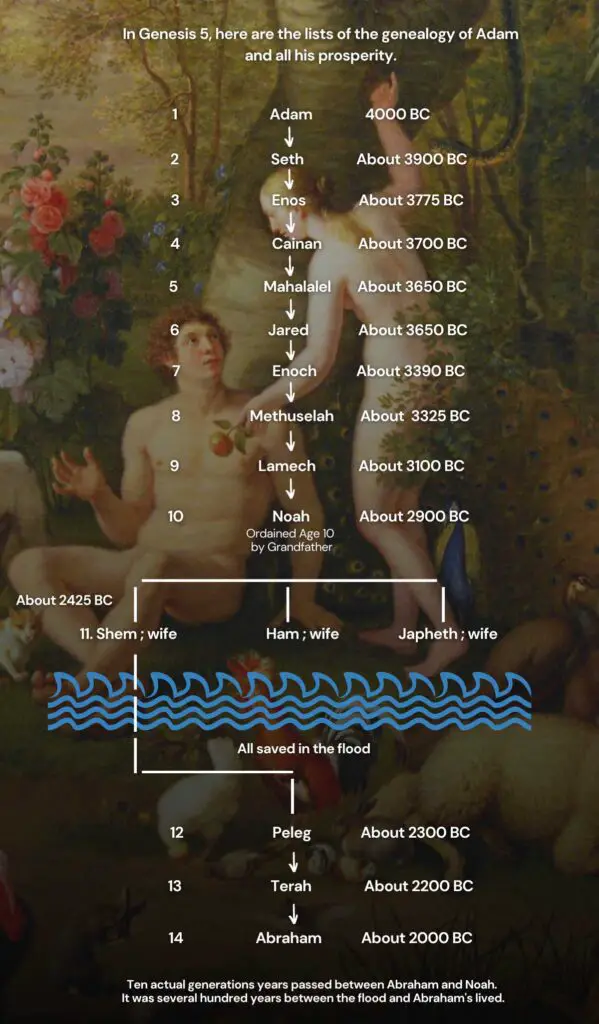
Noah Lived After Adam
Noah lived after Adam. In his genealogy or family history, we learn that he was the son of Lamech, the grandson of Methuselah, and the great-grandson of Enoch. Noah is related to Adam, but ten generations separate them.
Noah was ordained to the priesthood of Adam when he was ten years old by his grandfather Methuselah; his father was Lamech, the son of Methuselah.
We know that Noah was a person of integrity and honor, but he lived in a time when there was wickedness. The people during his day always wanted to do evil.
Because of his ordination from his grandfather, Noah was called to preach to the people, but they would not listen to him. Noah was not a very successful missionary, as his preaching was in vain, and the people did not repent of their wicked ways.
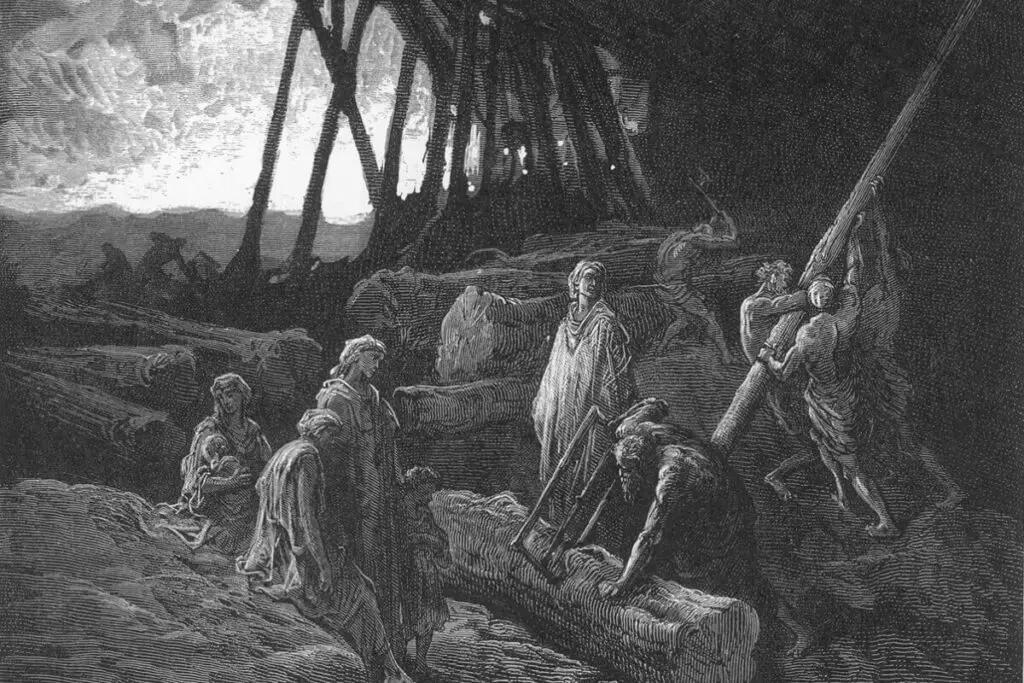
God commanded Noah to build an ark or a large ship and gather all the animals in pairs to prepare for a flood that he would put on the land. The Lord saved Noah and his wife and Noah’s sons Shem, Ham, and Japheth and their wives.
After the flood and all the wicked people drowned, they were the only ones left on the earth.
The flood symbolized the Lord cleansing the earth in the same way that Christians believe when they are baptized, they are also cleansed, and their sins are forgiven and washed away.
Abraham Lived After Noah And Adam
Abraham lived after both Noah and Adam. He was also related to Adam and Noah. Abraham came from Noah’s Son Shem; he was four generations away from Noah.
Shem had a son named Peleg and Peleg had a son named Terah. It was Terah, who was Abraham’s father.
Abraham is a mighty prophet in the Old Testament. He is often called the “father of the faithful.” Through Abraham’s family and lineage, Christ came to this earth.
Because of that, we can continue the genealogy from Adam to Christ through the lineage of Abraham.
Abraham and his wife Sarah had a baby boy they loved dearly named Issac; the Lord promised Abraham their family would bless the earth through Issac.
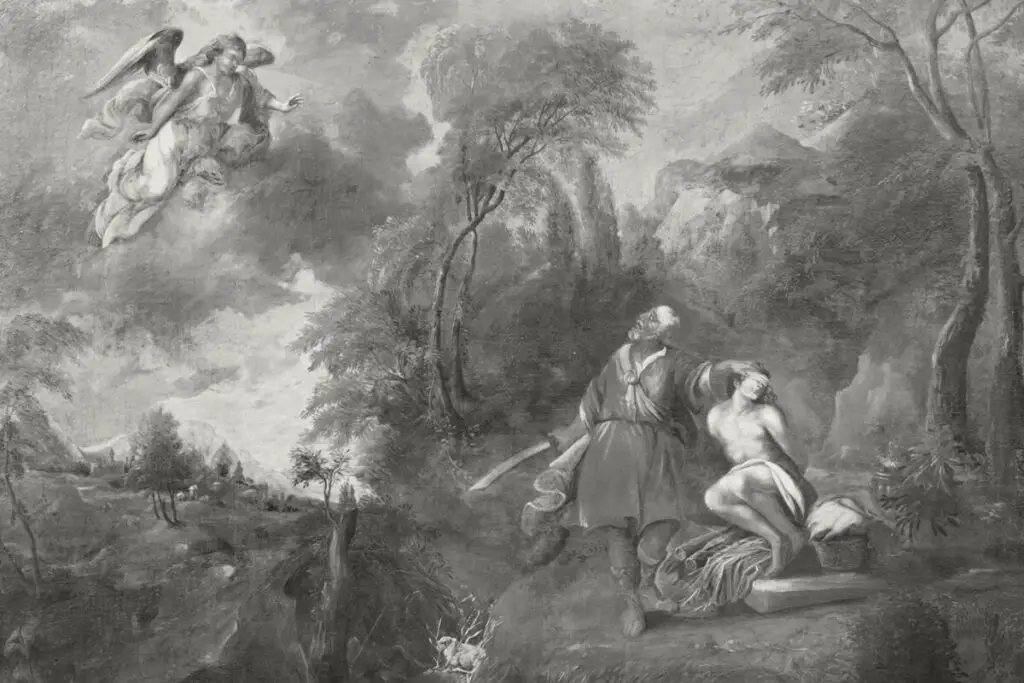
One day the Lord commanded Abraham to take Isaac up to Mount Moriah and to offer Issac as a sacrifice; in those days, they would usually offer a lamb or animal to sacrifice to show their obedience to the Lord.
On the way to Mount Moriah, Issac asked his father Abraham where their lamb for the sacrifice was; Abraham told Issac that the Lord would provide for them.
On Mount Moriah, Abraham built an altar and placed wood on it. Abraham then asked Issac to lie down on the altar; Issac trusted in Abraham, so he did.
Just as Abraham was ready to sacrifice Issac, an angel came to stop him; then, Abraham saw a ram in the bushes they could use for their sacrifice.
Like many things in the Old Testament, Abraham’s sacrifice of Issac was the symbolic sacrifice that God would offer up his son Jesus Christ upon the cross as a sacrifice.
Abraham showed extraordinary faith in being willing to sacrifice his only son. That is why Abraham is often called the “father of the faithful,” as not only did he live up to his faith when tested, but the lineage of Christ comes through Abraham’s line.
Will you look at Abraham, Noah, and Adam, we learn that genealogy and keeping family records is very important. Adam, Noah, and Abraham all understood their genealogy and its importance.
They show us that family history and keeping track of our ancestors is not new, but something people have been doing since the very beginning or when the earth was created.
The Hummel Family is a website all about Family History research. We focus on Swedish, German, English, Scottish, and American Genealogy. We also discussed Asia and China, as we had ancestors who spent many years in China.
You are welcome to join us and become part of our community by signing up for our FREE newsletter, The Hummel Family; sign up by clicking here.
Check out our Youtube Channel, Family HIstory Buzz, by clicking here.
Frequently Ask Question
Who came first, Noah, Adam, or Abraham?
According to biblical chronology, Adam came first, followed by Noah, and then Abraham.
Who was Adam?
Adam is believed to be the first human being, created by God according to the biblical account of creation in the Book of Genesis.
Who was Noah?
Noah was a biblical figure known for building an ark to save his family and animals from the great flood as described in the Book of Genesis.
Who was Abraham?
Abraham, also known as Abram, was a prominent figure in the Hebrew Bible and the founder of the Abrahamic religions. He is considered the father of the Jewish people.
In what order did these individuals appear in biblical history?
According to biblical narratives, Adam was the first human, followed by Noah, and then Abraham.
Are there specific time periods associated with each of these individuals?
While the Bible provides approximate ages and lifespans for these individuals, the specific time periods are subject to interpretation and may vary depending on the source.
Did Adam and Noah live during the same era?
No, according to biblical narratives, there was a significant time gap between Adam and Noah. Adam lived in the early stages of human existence, while Noah lived thousands of years later.
Did these individuals interact with each other?
No, according to biblical narratives, there is no record of direct interactions between Adam, Noah, and Abraham due to the significant time spans between their lifetimes.
Related Content
What Are The Swedish Mantal Tax Records? History & Genealogy Research Tips
The Swedish Mantal tax system was the tax system prevalent in Sweden for over 300 years. The Mantal tax was a tax placed upon Swedish households and people. The Mantal tax system was organized and structured.
By clicking here, you can learn more about, What Are The Swedish Mantal Tax Records? History & Genealogy Research Tips
Why Do So Many Swedish Last Names End In Son?
Many Swedish last names end with “son or “sson” as they are patronymic names. When doing your Swedish family history research, one of the most important things you need to understand is how Swedish last names work.
By clicking here, you can learn more about, Why Do So Many Swedish Last Names End In Son?
